Tag: literary prizes
On the shortlist: Runeberg Prize 2014
12 December 2013 | In the news
On the shortlist of the Runeberg Prize 2014 are eight books. Four of them are novels: Lapset auringon alla (‘Children under the sun’, WSOY) by Miki Liukkonen, Jokapäiväinen elämämme (‘Our daily life’, Teos) by Riikka Pelo (which was awarded the Finlandia Prize for Fiction in December), Pintanaarmuja (‘Scratches’, ntamo) by Maaria Päivinen and Terminaali (‘The terminal’, Siltala) by Hannu Raittila.
The other four books on the list are two collections of poetry, Pakopiste (‘Vanishing point’) by Kaisa Ijäs (Teos) and Öar i ett hav som strömmar by Henrika Ringbom (Schildts & Söderströms). Ahtaan paikan kammo (‘Claustrophobia’, Robustos) by Riitta S. Latvala is a collection of short stories, and Kopparbergsvägen 20 (‘Kopparbergsvägen Road 20’, Schildts & Söderströms) by Mathias Rosenlund is an autobiographical work.
The list was compiled by a jury of three: cultural editor and critic Elisabeth Nordgren, author and critic Irja Sinivaara and author Jouko Sirola.
The prize, worth €10,000, was founded by the Uusimaa newspaper, the City of Porvoo, both the Finnish and Finland-Swedish writers’ associations and the Finnish Critics’ Association. On 5 February, on the birthday of the national poet J.L. Runeberg (1804–1877), it will be awarded for the 28th time in his native town of Porvoo.
The Finlandia prizes: Non-fiction, Junior
28 November 2013 | In the news

Ville Kivimäki. Photo: Pertti Nisonen
The Finlandia Prize for Non-Fiction 2013, worth €30,000, was awarded on 21 November to the historian Ville Kivimäki for his book Murtuneet mielet. Taistelu suomalaissotilaiden hermoista 1939–1945 (‘Broken minds. The battle ofor the nerves of Finnish soldiers 1939–1945’, WSOY).
The other works on the shortlist of six were as follows: 940 päivää isäni muistina (‘940 days as my father’s memory’, Teos; a book on Alzheimer’s disease) by Hanna Jensen, Kokottien kultakausi: Belle Epoquen mediatähdet modernin naiseuden kuvastimina (‘The golden era of the cocottes: the media stars of Belle Epoque as mirrors of modern femininity’, Finnish Literature Society) by Harri Kalha, Viipuri 1918 (‘Vyborg 1918’, Siltala) by Teemu Keskisarja, Suomi öljyn jälkeen (‘Post-oil Finland’, Into) by Rauli Partanen, Harri Paloheimo and Heikki Waris and Vapaalasku – tieto, taito, turvallisuus (‘Freestyle – knowledge, skill, safety’, Kustannus Oy Vapaalasku) by Matti Verkasalo, Jarkko-Juhani Henttonen and Kai Arponen.
The prize-winner was chosen by the director of the Ateneum Art Museum, Maija Tanninen–Mattila. In her celebratory speech she said: ‘The symptoms of many psychologically disturbed soldiers remained untreated during the war. For many, their symptoms appeared only after the war. Their experiences have remained unexpressed in language, the history of those who lack history. Ville Kivimäki has given voice to these experiences… and succeeded in writing a book that speaks across the generations.’
In his acceptance speech Ville Kivimäki (born 1976) commented: ‘The great majority of the war generation is now dead, and the words of a youngish scholar cannot, even when successful, reach those traumatic experiences whose depth we can never fully understand. But all the same, I would like to take this opportunity to say something that should have been said years ago: the psychological injuries of the war were war wounds in exactly the same sense as physical ones. In the end anyone could suffer a psychological breakdown.’

Kreetta Onkeli. Photo: Jouni Harala
The Finlandia Junior Prize 2013 was awarded on 26 November, also worth €30,000. It went to Kreetta Onkeli for her book Poika joka menetti muistinsa (‘The boy who lost his memory’, Otava).
Arto, 12, gets such a massive fit of laughter that he loses his memory and needs to find his identity and his home in contemporary Helsinki.
The winner was chosen from the shortlist of six by Jarno Leppälä, a media personality and member of the popular stunt group Duudsonit, the Dudesons. At the award ceremony he said:
‘Poika joka menetti muistinsa is, in my opinion, a well-written story about how young people in society are put on the same starting line and expected to do equally well in all circumstances – often irrespective of the fact that their starting points may actually be very different, and completely independent of the young people themselves.’
Kreetta Onkeli (born 1970) explained in her award speech how her aim was to write a proper, old-fashioned novel for children: ‘Not hundreds of pages of magic tricks but ordinary, real contemporary life that children could identify with.’ In her opinion the current, massive trend of fantasy has narrowed the scope of children’s literature.
The following five books made it on to the shortlist: Poika (‘The boy’, Like), about a boy who feels he was born in the wrong gender by Marja Björk, Hipinäaasi, apinahiisi (onomatopoetic pun, ‘Donkeymonkey’, Tammi), about bullying and friendship, written by Ville Hytönen and illustrated by Matti Pikkujämsä, Isä vaihtaa vapaalle (‘Father on his own time’, WSOY), an illustrated story about children with too busy parents, written by Jukka Laajarinne and illustrated by Timo Mänttäri, Aapine (‘ABC’, Otava), an illustrated primer written by Heli Laaksonen in her own south-western dialect and illustrated by Elina Warsta and Vain pahaa unta (‘Just a bad dream’, WSOY) by graphic designer and writer Ville Tietäväinen and his daughter Aino, a book on a child’s nightmares.
Finlandia literary prizes are awarded by Suomen Kirjasäätiö, The Finnish Book Foundation, established in 1983.
The first Finlandia Prize for Fiction was awarded in 1984. This year it will be announced on 3 December.
Ecstasy rewarded
28 November 2013 | In the news
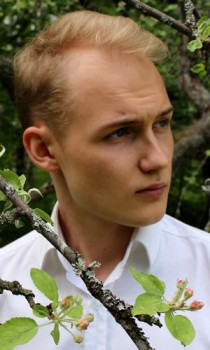
Erkka Filander. Photo: Virpi Alanen
On 14 November Helsingin Sanomat Literature Prize, the Helsinki newspaper’s prize for the best first work of the year, worth €15,000, was awarded for the 19th time.
The jury made its choice from 90 first works, and this time the prize was awarded to a youngest writer ever, the poet Erkka Filander (born 1993), for his collection Heräämisen valkea myrsky (‘The white storm of awakening’; available as a pdf at the home page of the publisher, Poesia).
According to the jury, this poetry is ‘ecstatic poetry, pulsing with the joy of living… there is no place in Filander’s poetry for cynicism or irony. Thus his writing appears, in the context of contemporary poetry, exceptionally open and sincere.’
Finlandia Prize for Fiction 2013
14 November 2013 | In the news
One of the following six novels will be awarded this year’s Finlandia Prize for Fiction, worth 30,000 euros: Ystäväni Rasputin (’My friend Rasputin’) by JP Koskinen, Hotel Sapiens (Teos) by Leena Krohn, Jokapäiväinen elämämme (‘Our everyday life’, Teos) by Riikka Pelo, Terminaali (‘The terminal’, Siltala) by Hannu Raittila, Herodes (‘Herod’, WSOY) by Asko Sahlberg and Hägring 38 (‘Mirage 38’, Schildts & Söderströms; Finnish translation, Kangastus, Otava) by Kjell Westö.
Half of the writers have already won the Finlandia Prize once, namely Krohn (1992), Raittila (2001) and Westö (2006).
Four of the six works deal with a historical character or history: Koskinen with the Russian ‘holy man’ Rasputin, Pelo with the Russian poet Marina Tsvetaeva, Sahlberg with Herod the Great of Judea. Westö goes back to the year 1938 in Finland.
Raittila’s realistic novel takes place on contemporary airports. Krohn, again taking a look at an unknown future, presents the reader with a imaginary Earth which no longer is habitable to humans.
The runners-up were chosen by a jury – appointed by the Finnish Book Publishers’ Association – of three: the journalists Nina Paavolainen and Raisa Rauhamaa and the translator Juhani Lindholm. The winner of the 30th Finlandia Prize for Fiction will chosen by theatre manager of the Helsinki City Theatre and actor Asko Sarkola, and announced on 3 December.
Northern prizes
31 October 2013 | In the news
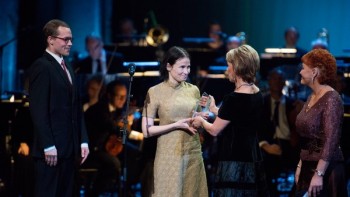
The winners: Seita Vuorela and Jani Ikonen are presented with their prize. Photo: Magnus Froderberg/Nordic Council
The Nordic Council’s five culture prizes were for the first time awarded together at a Gala at the Oslo Opera House on 30 October. The show was broadcast by all the Nordic public service channels.
The winners of the Nordic Council Children and Young People’s Literature Prize 2013 – worth about €43,000 – are Seita Vuorela and Jani Ikonen from Finland. Karikko (‘The reef’, see our review) written by Vuorela and illustrated by Ikonen is the first work to be awarded the newly established Nordic Council Children and Young People’s Literature Prize.
Another Finnish winner this time was the violinist Pekka Kuusisto (born 1976) who won the Nordic Council Music Prize (also worth €43,000). ‘Pekka Kuusisto is a violinist in the absolute elite and with as much unique creativity as musicality,’ said the Adjudication Committee.
The 2013 Nordic Council Literature Prize went to a Danish-Norwegian author Kim Leine. The Finnish nominees were Rosa Liksom and Ulla-Lena Lundberg.
The oldest of the five prizes is the Literature Prize, first awarded in 1962. It was followed by the Music Prize (1965), the Nature and Environment Prize (1995), the Film Prize (2002) and the Children and Young People’s Literature Prize (2013).
The 2013 European Union Prizes for Literature
3 October 2013 | In the news
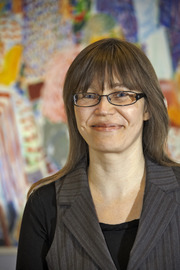
Katri Lipson. Photo: Olli Turunen
The second novel Jäätelökauppias (‘The ice-cream vendor’, Tammi, 2012) by Katri Lipson won her one of the 12 European Union Prizes for Literature this year, announced at the Gothenburg Book Fair, Sweden, on 26 September.
Each winner will receive € 5,000, and the priority to apply for European Union funding to have their book translated into other European languages.
The European Commission, the European Booksellers’ Federation (EBF), the European Writers’ Council (EWC) and the Federation of European Publishers (FEP) are the organisers of the prize which is supported through the European Union’s culture programme. The competition is open to authors in the 37 countries involved in the Culture Programme.
The prize aims to draw attention to new talents and to promote the publication of their books in different countries, as well as celebrating European cultural diversity.
The previous Finnish winner of the prize was Riku Korhonen in 2010.
The books that sold
21 February 2013 | In the news
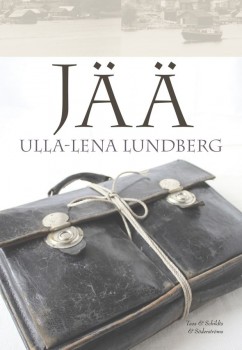 The winner of the Finlandia Prize for Fiction 2012, Ulla-Lena Lundberg’s novel Is (‘Ice’), also turned out to be the winner of the ‘Shadow Finlandia’ prize of the Academic Bookstore in Helsinki. The novel, set on the Åland islands in postwar years, was simultaneously published in Finnish as Jää. This book trade prize is awarded to the best-selling title of the six finalists on the Finlandia Prize list.
The winner of the Finlandia Prize for Fiction 2012, Ulla-Lena Lundberg’s novel Is (‘Ice’), also turned out to be the winner of the ‘Shadow Finlandia’ prize of the Academic Bookstore in Helsinki. The novel, set on the Åland islands in postwar years, was simultaneously published in Finnish as Jää. This book trade prize is awarded to the best-selling title of the six finalists on the Finlandia Prize list.
The best-selling Finnish debut work in the Academic Bookstore was Nälkävuosi (‘The hunger year’, Siltala) by Aki Ollikainen.
Also number one on the December list of best-selling Finnish fiction titles compiled by the Finnish Booksellers’ Association was Lundberg’s novel – in its Finnish translation; the original Swedish-language book came number ten on the same list.
Number two was Sofi Oksanen’s new novel set in Estonia, Kun kyyhkyset katosivat (‘When the doves disappeared’, Like), and number three the hilarious graphic story, Piitles. Tarina erään rockbändin alkutaipaleesta (‘Beatles. The story of the first stage of a rock band’, Otava), by Mauri Kunnas who has written and illustrated dozens of children’s books.
In first and second place on the translated fiction list were J.K. Rowling and J.R.R. Tolkien (The Casual Vacancy, The Hobbit or There and Back Again).
Children chose Finnish books in December – or rather their parents did, buying them as Christmas presents – for the first four places were taken by popular writers such as Sinikka and Tiina Nopola, Aino Havukainen & Sami Toivonen, Mauri Kunnas (Piitles is for mums and dads, not kids!) and Timo Parvela.
On the non-fiction list there was a selection of world record books, cookbooks and biographies – not unusual, considering the season – but number one was Kaiken käsikirja (‘Handbook of everything’) by astronomer and popular writer Esko Valtaoja. A present for all occasions, then?
Runeberg Prize 2013 for poetry
8 February 2013 | In the news

Olli-Pekka Tennilä. Photo: Aleksis Salusjärvi, 2012
The Runeberg Prize for fiction, awarded on 5 February, this year for the twenty-seventh time, went to a book of poetry by Olli-Pekka Tennilä (born 1978).
Tennilä’s second work, Yksinkeltainen on kaksinkeltaista (‘Doubly simple’, a pun: yksinkertainen = simple, kaksinkertainen = double, keltainen = yellow), published by Poesia, makes use of a child’s open-minded use of language and studies the world of the bees. Tennilä is one of the founding members of Osuuskunta Poesia, a poetry cooperative, and is currently its publishing director.
The prize, worth €10,000, was awarded on 5 February – the birthday of the poet J.L Runeberg (1804–1877) – in the southern Finnish city of Porvoo.
The jury, writer Tommi Melender, critic Siru Kainulainen and theatre manager Dan Henriksson – representing the prize’s founders, the Uusimaa newspaper, the city of Porvoo, both the Finnish and Finland-Swedish writers’ associations and the Finnish Critics’ Association – chose the winner from a shortlist of eight books. In their opinion the winning work is both ‘a structurally controlled and expressively vital whole; it demonstrates how the linguistic logic of a small child can be employed again as an adult.’
The other seven finalists were a book of essays, Toinen jalka maassa ja muita esseitä (‘One foot on the ground and other essays’, WSOY) by Markku Envall, two poetry collections, Keisarin tie (‘The emperor’s road’, Otava) by Lassi Hyvärinen and Kuolinsiivous (‘Death cleaning’, WSOY) by Eeva Kilpi, two collections of short stories, Kadonnut ranta (‘Lost shore’, WSOY) by Tiina Laitila Kälvemark and Till dig som saknas (‘To you who are missing’, Schildts&Söderströms) by Peter Sandström, as well as two novels, Rikosromaani (‘Crime novel’, Otava) by Petri Tamminen and Neuromaani (‘Neuromane’, Otava) by Jaakko Yli-Juonikas.
The Dancing Bear Poetry Prize goes to a first work
17 January 2013 | In the news
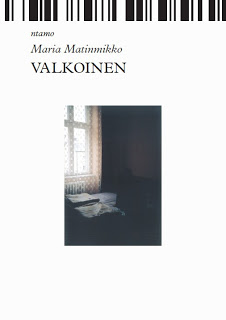 The Dancing Bear Poetry Prize, worth €3,500, is awarded annually by Yleisradio, the Finnish Broadcasting Company, to a book of poetry published the previous year.
The Dancing Bear Poetry Prize, worth €3,500, is awarded annually by Yleisradio, the Finnish Broadcasting Company, to a book of poetry published the previous year.
This year’s winner – announced on 16 January – is Maria Matinmikko (born 1983) for her first collection, Valkoinen (‘White’, Ntamo). The prize has been awarded since 1994.
The winner was selected by a jury of two journalists, Tarleena Sammalkorpi and Marit Lindqvist, the culture editor Minna Joenniemi and the poet Sinikka Vuola. In their opinion, the publishing of poetry – Finnish and translated – is getting more dependent on small, dedicated publishers.
The jury found the winning work ‘a delicate, suggestive series of consecutive and simultaneous spaces transversing each other…. The layout, with the speakers of the text and the leitmotiv – the colour white, whiteness – form an exciting, spacious surface….’
In addition to the Dancing Bear Poetry Prize, the Finnish Broadcasting Company also awards a prize for the best poetry translation., worth €1,000. This time the winner is translator Jukka Mallinen, specialised in Russian contemporary literature, for his two translations: Punainen auringonlasku (‘Red sunset’) by the Belarussian poet Vladimir Nekljajev and Joulupaasto (‘Christmas fast’, on the siege of Leningrad) by Sergei Zavyalov. The jury commented that the poems have been translated with a passion typical to Mallinen, whose work is based on a profound knowledge of Russian literature.
Finlandia Junior Prize 2012
5 December 2012 | In the news
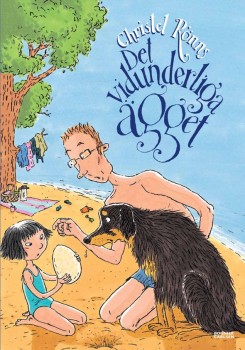 The Finlandia Junior Prize 2012 went to the illustrator and writer Christel Rönns for her book Det vidunderliga ägget (‘The extraordinary egg’, Söderströms & BonnierCarlsen).
The Finlandia Junior Prize 2012 went to the illustrator and writer Christel Rönns for her book Det vidunderliga ägget (‘The extraordinary egg’, Söderströms & BonnierCarlsen).
The winner was chosen from the shortlist of six by the film director and actor Mari Rantasila. Awarding the prize, worth €30,000, on 29 November she said:
‘The book has masterly, original and clear illustrations that support the story; the drawings include amusing details. It is refreshing to read a story about a family that all pulls in the same direction.
‘Det vidunderliga ägget deals with important matters, in a way that is suitable for small children: toleration of difference and the difficulty of loss, underlining that difference is not frightening or negative.’
The following five books also made it to the shortlist: Nörtti: new game (‘The nerd: new game’, Otava), about a schoolboy, bullying and social media by Aleksi Delikouras, Tatu ja Patu pihalla (‘Tatu and Patu on the yard’, Otava), a new picture book in the series about two curious little boys by Aino Havukainen and Sami Toivonen, Hurraa Helsinki! (‘Hurrah Helsinki!’, Tammi), a picture book about Helsinki by Karo Hämäläinen and Salla Savolainen, Puhelias Elias (‘Talkative Elias’, Tammi), an illustrated story about a little boy and his parent’s separation by Essi Kummu and Marika Maijala, and Kirkkaalla liekillä (‘With a bright flame’, Robustos), about 15-year-old Maaria, who lives through difficult times, by Venla Saalo.
Finlandia Prize for Non-Fiction 2012
5 December 2012 | In the news
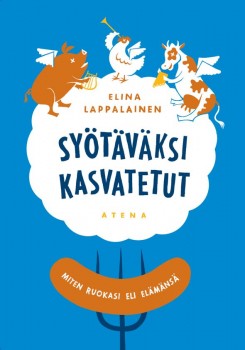 ‘It is one of the rules of quality journalism that writers aim for even-handed and impartial reporting, but at the same time challenge their respondents to account for their actions. Writers should also have the capacity for in-depth reporting and analysis,’ said Janne Virkkunen, former Editor-in-Chief of Helsingin Sanomat newspaper on 8 November, as he announced the winner of this year’s Finlandia Prize for Non-Fiction, worth €30,000.
‘It is one of the rules of quality journalism that writers aim for even-handed and impartial reporting, but at the same time challenge their respondents to account for their actions. Writers should also have the capacity for in-depth reporting and analysis,’ said Janne Virkkunen, former Editor-in-Chief of Helsingin Sanomat newspaper on 8 November, as he announced the winner of this year’s Finlandia Prize for Non-Fiction, worth €30,000.
The winner, Syötäväksi kasvatetut. Miten ruokasi eli elämänsä (‘Grown to be eaten. How your food lived its life’, Atena) by the young journalist Elina Lappalainen, is her first book.
‘The book could have fallen prey to the sensationalism of which we all probably have experience in the media, at least. This writer was able to avoid the temptation,’ Janne Virkkunen said.
The other works on the shortlist of six were as follows: Arabikevät (‘The Arab spring’, Avain), a study of spring 2011 in the Arab world by Lilly Korpiola and Hanna Nikkanen, Norsusta nautilukseen. Löytöretkiä eläinkuvituksen historiaan (‘From the elephant to the nautilus. Explorations into the illustration of animals’, John Nurminen Foundation) by Anto Leikola, Kevyt kosketus venäjän kieleen (‘A light touch to the Russian language’, Gaudeamus) by professor of Russian Arto Mustajoki, Karhun kainalossa. Suomen kylmä sota 1947–1990 (‘Under the arm of the Bear. Finland’s Cold War 1947–1990’, Otava) by Jukka Tarkka and Markkinat ja demokratia. Loppu enemmistön tyrannialle (‘Market and democracy. The end of the tyranny of the majority’, Otava) by banker Björn Wahlroos.
Finlandia Prize for Fiction candidates 2012
23 November 2012 | In the news
The candidates for the Finlandia Prize for Fiction 2012 were announced on 15 November. They are Riikka Ala-Harja, Pirjo Hassinen, Heidi Köngäs, Ulla-Lena Lundberg, Aki Ollikainen and Juha Seppälä.
Their novels, respectively, are Maihinnousu (‘The landing’, Like), Popula (Otava), Dora, Dora (Otava), Is (‘Ice’, Schildts & Söderströms), Nälkävuosi (‘The year of hunger’, Siltala) and Mr. Smith (WSOY).
The jury – researcher Janna Kantola, teacher of Finnish Riitta Kulmanen and film producer Lasse Saarinen – made their choice out of ca. 130 novels. The winner, chosen by Tarja Halonen, who was President of Finland between 2000 and 2012, will be announced on 4 December. The prize, awarded since 1984, is worth 30,000 euros.
The jury’s chair, Janna Kantola, commented: ‘One of this year’s recurrent themes is the Lapland War [of 1944–1945]. Writers appear to be pondering the role of Germany in both the Second World War and in contemporary Europe. Social phenomena are examined using satire; the butt is the birth and activity of extremist political movements. Economics, the gutting of money and market forces, are present, as in previous years, but now increasingly with a sense of social responsibility.’
Popula deals with people involved in a contemporary populist political party. Dora, Dora describes Albert Speer’s journey to Finnish Lapland in 1943. Nälkävuosi depicts the year of hunger in Finland, 1868. Is takes place in the Finnish archipelago of the post-war years. Mr. Smith portrays greed and the destructive power of money both in Russian and Finnish history as well as in contemporary Finland. Maihinnousu, set in Normandy, depicts a child’s serious disease in a family that is going through divorce.
On life and death
23 November 2012 | In the news
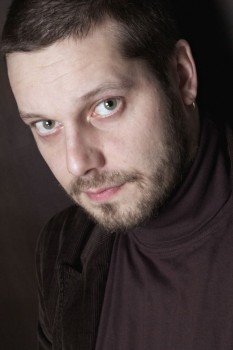
Aki Ollikainen. Photo: Laura Malmivaara
On 15 November Helsingin Sanomat Literature Prize, the Helsinki newspaper’s prize for the best first work of the year, worth €15,000, was awarded for the 18th time.
The winner was journalist Aki Ollikainen (born 1973) with his first novel Nälkävuosi (‘The hunger year’, Siltala). The jury made the choice from 80 first works.
The hard years of 1867 and 1868 almost a tenth of the Finnish population died of hunger and diseases. Nälkävuosi portrays poor people in the country who are forced to leave home and look for any food they can find, and well-to-do gentlemen in town who can afford to amuse themselves with women, for example. This slim novel speaks of life and death; finally, after a deadly winter there will be new hope for better times.
Aki Ollikainen: Nälkävuosi [The year of hunger]
23 November 2012 | Mini reviews, Reviews
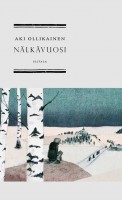 Nälkävuosi
Nälkävuosi
Helsinki: Siltala, 2012. 139 p.
ISBN 978-952-234-089-4
€32.90, hardback
Finland, winter 1867, famine. The historical framework of this first novel by Aki Ollikainen (born 1973) is barren and the twists of the plot, almost without exception, are dark. The novella weaves together two stories: the poor people of the countryside live hand to mouth, whereas city businessmen, the brothers Teo and Lars Renqvist, agonise about their love problems in their well-heated houses. Of a family of four that sets out from the countryside on a begging mission, only one lives to see the following spring and the melting of the snow. The beast in people leaps forth: when there is no longer anything left to lose, humanity, an unnecessary burden, is trampled into the mud. The whiteness of the endless winter becomes the colour of hunger and of death. Ollikainen’s brief and tragically beautiful novel – which won the Helsingin Sanomat Prize for first works in November – tells its cruel tale with a warmth that is not in conflict with the events it describes. When the roads of city gents and country people entwine, humanity wins, light dawns.
Translated by Hildi Hawkins
Government prize for translation 2012
14 September 2012 | In the news

Vladimír Piskoř. Photo: Charlotta Boucht
The Finnish Government Prize for the Translation of Finnish Literature of 2012 – worth €15,000 – was awarded to the Czech translator Vladimír Piskoř.
Piskoř (born 1960), graduated from the Charles University of Prague in 1984, majoring in Finnish. Since the early 1990s he has translated almost 30 titles, most by contemporary authors, including Kristina Carlson, Kari Hotakainen, Leena Krohn, Rosa Liksom, Asko Sahlberg, Juha Seppälä, Petri Tamminen and Maria Peura.
‘I personally am fond of the novels by Kari Hotakainen: I sometimes play with the idea of becoming a writer myself, and I find his style and themes particularly interesting. Kristina Carlson’s latest novel Herra Darwinin puutarhuri (‘Mr Darwin’s gardener’, 2010) is a truly inspiring work both as a reader and a translator,’ he says.
Piskoř is currently working on Kari Hotakainen’s novel Jumalan sana (‘The word of God’) and Leena Lander’s historical novel Käsky (‘Command’). In 2006 he was awarded the Czech translators’ special prize for the novel Höyhen (‘Feather’) by Asko Sahlberg.
Vladimír Piskoř received his award in Helsinki on 10 September from State Secretary Jarmo Lindén; he thanked Piskoř for the work he has done for the last twenty years, particularly in the field of contemporary Finnish fiction.
The prize has been awarded – now for the 38th time – by the Ministry of Education and Culture since 1975 on the basis of a recommendation by FILI – Finnish Literature Exchange.
